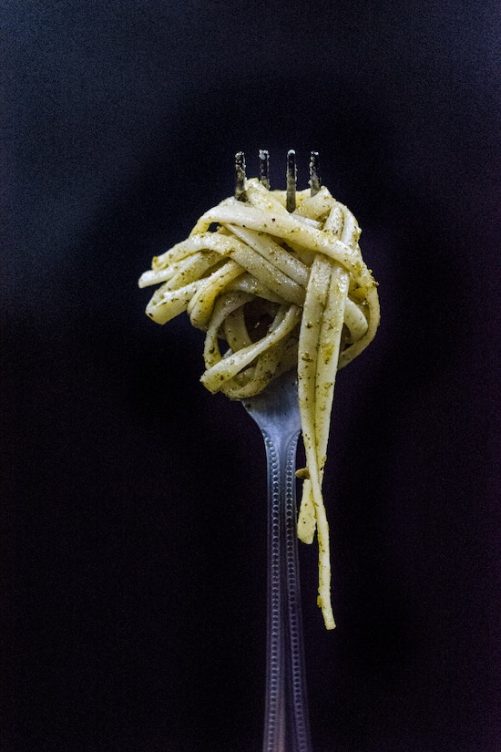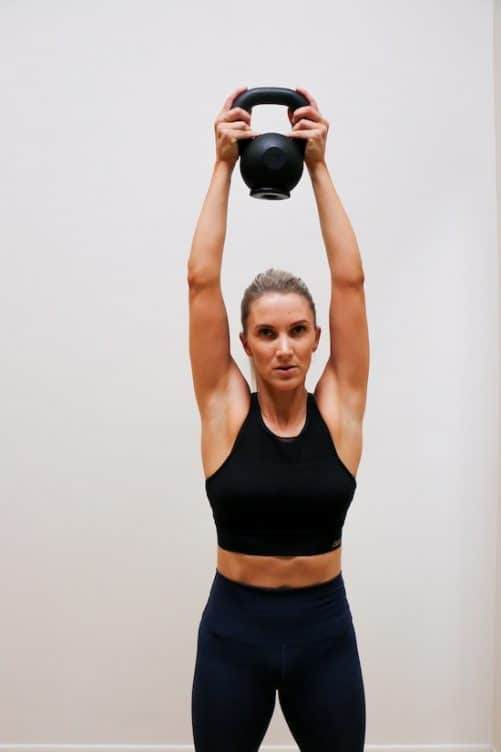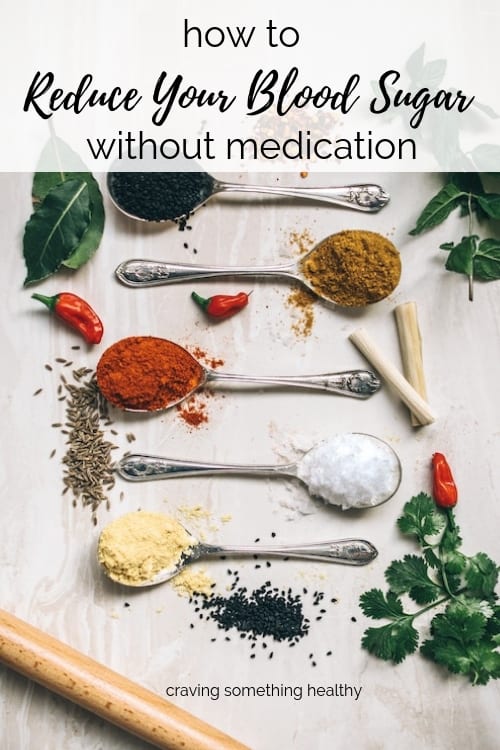How to Reduce Your Blood Sugar Naturally
This post contains affiliate links for products I use and recommend, meaning, at no additional cost to you, I may earn a commission if you click through and make a purchase.
If your doctor has told you that your fasting blood sugar or your A1C (a 3-month blood sugar average) is higher than normal, you may be on your way to developing diabetes.
Before you panic, it’s important to know you can reduce your blood sugar naturally. If you’re proactive about changing your diet and lifestyle and adding a few supplements if needed, you can probably prevent diabetes – or at least hold it off for a long time.
Keep reading to learn which foods can lower your blood sugar naturally, some supplements to discuss with your doctor, and other important lifestyle strategies to reduce your risk of diabetes.
Diabetes and Prediabetes Statistics
- According to the American Diabetes Association, 37.3 million people (about 11.3% of the U.S. population) have diabetes
- Another 8.5 million people have it but haven’t been diagnosed
- More than 96 million American adults have prediabetes (2)
- People with diabetes spend 2.3 times more on healthcare compared to those without the disease
As you get older, the risk of diabetes increases.
Here’s why you should care: Diabetes increases your risk of heart attack or stroke. It’s also a major cause of nerve damage in your feet, hands, or even your stomach, problems with your eyesight, and kidney failure. Diabetes also hits you hard in your wallet because of the added doctor visits, bloodwork, and medications needed to manage and monitor it.
What's a Normal Blood Sugar?
Normal blood sugar is fasting glucose less than 100 mg/dl, or an A1C less than 5.7%.
A diagnosis of diabetes is made when your fasting glucose is greater than 125 mg/dl, or your A1C is over 6.5%.
If you’re stuck in the middle, with fasting glucose between 100 and 125 mg/dl and an A1C between 5.7 and 6.4%, you probably have prediabetes. Have it checked more than once, just in case, but if it’s confirmed, you’re not alone.
Most of us know a few – or many - friends or family members in the same boat. I talk to so many people with a family history of diabetes, they just assume it will happen to them. But it doesn’t have to.
If you’re willing to do the work, there are ways to lower your blood sugar naturally and prevent diabetes. Here’s how:
Natural Ways to Reduce Blood Sugar
If you’re developing diabetes, it means your insulin isn’t working as well as it should, and you’re becoming insulin-resistant. Insulin is the hormone that shuttles glucose (the digested form of carbohydrates) from your blood and into your cells.
These tips can help prevent diabetes in three different ways:
- They can keep excess glucose out of your body
- They can help your insulin work better, so it clears glucose out more efficiently
- They can reduce the amount of glucose released from your liver into your blood
Eat a lower-carb diet
If you eat fewer carbohydrate-rich foods, you’ll have less glucose available in your blood, and your insulin won’t have to work as hard.

You can try a very low carb or keto diet for a few months if you want to crack down and lose some weight, but many find it hard to stick to.
Most people see an improvement in their blood sugar (and weight loss too) if they just cut back to about 20-30 grams of carbohydrate at each meal. That’s a low-carb diet, but not keto because you can still have lots of vegetables plus one small serving of fruit, legumes, OR a whole grain like oats, farro, or quinoa at each meal.
Remember that carbs aren’t bad. Fruits, vegetables, legumes, and whole, unprocessed grains provide good carbs that your body loves for slow-burning fuel and long-lasting energy.
However, most people eat too many unhealthy carbs from sweets and refined breads, cereals, and other “white stuff.” Those carbs get digested too quickly and make your insulin work overtime.
Add these anti-diabetes foods to your diet
Certain foods can help reduce blood sugar or prevent spiking after a starchy meal. Foods that are high in soluble fiber have a lower glycemic index. They can help balance blood sugar by slowing down your digestion. These include:
- Legumes or pulses (lentils, chickpeas, black, pinto, kidney beans)
- Chia seeds
- Flaxseeds
- Oats
- Broccoli
- Carrots
- Pears
Healthy fats can help you feel full and satisfied faster. When you eat them with carbs, they also help to slow down your digestion, which balances your blood sugar. Good choices include:
- Nuts (any kind)
- Nutbutter (peanut butter, almond butter, etc.)
- Seeds (pumpkin, sunflower, hemp, chia, etc)
- Avocado
Apple cider vinegar, or any vinegar, when taken with a meal, has been shown to reduce fasting blood sugar levels. You can mix about 2 tablespoons with about ½ cup of water and drink it, or even better, eat it with your meal (salad with extra vinegar, anyone?)
Be more active throughout the day
We all know that exercise is good for us, but did you know it lowers your blood sugar too? Yep. When you get your heart rate up doing any kind of cardio activity, your muscles use more of that glucose.

In addition, when you build your muscles, your insulin works better. In short, your body becomes more sensitive to the effects of insulin – or less insulin-resistant.
Aim for about 200 minutes of cardio activity (the kind that gets your heart rate up) AND 2-3 strength training sessions each week.
200 minutes might sound like a lot, but remember, you can spread it out over the week. About 30 minutes a day, or 40 minutes 5 times each week of cardio (think brisk walking, jogging, swimming, biking, hiking, dancing, etc.) is great.
Adding in strength training sessions builds muscle, which boosts your metabolism and further reduces insulin resistance.
Get a good night’s sleep – every night
A good body of evidence shows that people who don’t sleep well – or those who work the overnight shift, have a greater risk of developing diabetes.
Loss of even one night’s sleep has a negative effect on how insulin works.

Most people require 7-8 hours of sleep each night. When you don’t get enough quality sleep, your body becomes insulin-resistant, and your brain and muscles don’t use glucose as well as they should.
Lack of sleep also messes with the hormones that control your appetite (5) so you’ll end up with uncontrollable cravings (I’m looking at you, cookies, ice cream, and chips), which leads to weight gain and more insulin resistance.
If you’re not a good sleeper, make that a priority ASAP! Check out this post for tips on how to sleep better.
Reduce your stress
Stress impacts your blood sugar in several ways.
- It’s a major reason many people have trouble sleeping
- When you’re feeling stressed, you tend to crave more carbs and sugary foods
- Most importantly, when you’re under persistent stress, your cortisol levels tend to stay too high
Cortisol is the fight-or-flight hormone. You experience its effects when you face something stressful. It causes your heart to beat faster and your blood pressure to increase. In addition, your insulin shuts down, and glucose and fat are pulled out of storage to be used as quick fuel.

The stress response is designed to help you fight or run from a stressor. Unfortunately, you can’t run away from family problems, a job you hate, or bills that are piling up – so that excess cortisol leads to high blood sugar, insulin resistance and belly fat – which often ends in diabetes.
I’ve seen many people improve their health by reducing stress. I’m a huge fan of meditation, deep breathing exercises, yoga, and adaptogenic herbs like Ashwagandha and Holy Basil . These balance your body and mind and increase your body's resistance to stress for a healthy stress response. Clinical studies also show adaptogenic herbs can lower cortisol levels.
Ask your doctor or dietitian about supplements for healthy blood sugar
These supplements are also helpful* in managing blood sugar
- Berberine can work much like the diabetes medication metformin in reducing blood sugar. It helps your insulin to work better. Ask your doctor if you should try berberine for a few months. DON’T take berberine and other blood sugar lowering medications together, though, because your blood sugar might drop too low!
- Cinnamon has also been shown to lower fasting glucose and A1C levels in people with diabetes. You can certainly sprinkle some cinnamon on your meals, but most studies use a good-quality cinnamon supplement.
- Magnesium plays so many different roles in the body, and many people don’t get enough. It’s helpful for anyone with diabetes or
prediabetes, because when your blood sugar is high, you tend to excrete more magnesium in your urine. People who are diagnosed with diabetes frequently tend to have lower levels of magnesium. About 200-400 mg of magnesium glycinate, taken in the evening, may also help relax you and fall asleep easier.
- A probiotic helps to boost the healthy bacteria in your gut. You might not associate gut health with blood sugar, but there’s lots of research that shows a link. (6) Some research shows those with diabetes have a less diverse gut microbiome than those without it. And get this - when scientists take bacteria from someone without diabetes and transplant it into the gut microbiome of someone with diabetes, their blood sugar improves. Eat some yogurt and fermented foods, drink some kefir or kombucha, or take a probiotic.
*If you’re interested in trying supplements to manage your blood sugar or any other health condition, please consult your health care provider before doing so. Just because supplements are “natural” doesn’t make them safe if they're used incorrectly! Some can interact with your medications or other health conditions.
If you're pregnant or nursing, don't take supplements without first checking with your doctor
In addition, I can only speak to the safety and effectiveness of professional-grade supplements. Some supplements do not contain enough of the active ingredient, or they may contain other fillers.
If you’re unsure about which supplement to take or the appropriate dose, please contact me. I offer a personalized mini nutrition consult with supplement recommendations. It's done via email and Zoom. I'm happy to help you!
If you've had success with improving your blood sugar naturally, let me know, and share your tips if you like!
Eat well!


I love the comprehensive nature of this post. There is so many things about our health that are in our hands and we can do a ton to manage them. Sharing this post with my father who has pre-diabetes. Thanks!
Thanks so much Jenny - I appreciate the nice comment and share!
The power of exercise isn’t talked about enough with diabetes! So so important - glad you included it.
So true! Too many people think it's just about carbs! Thanks for visiting Kelly 🙂